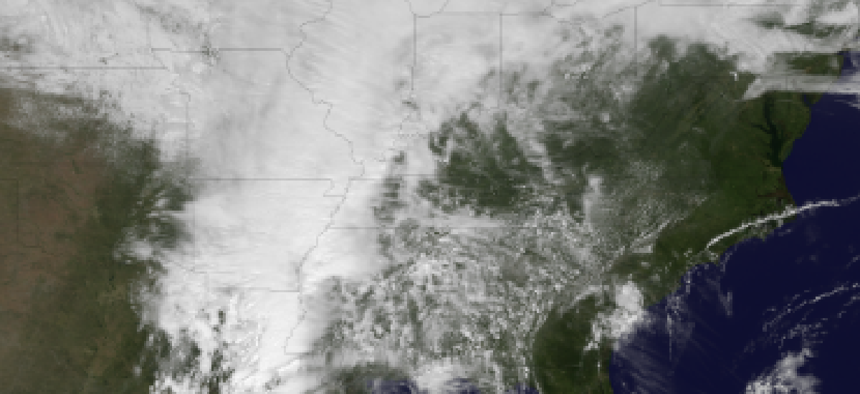Unintended benefits

Steve Kelman believes the government is often helpful – sometimes without even meaning to be.

Weather data from government agencies such as the National Oceanic and Atmospheric Administration is but one example of federal spending that can be put to good commercial use. (NOAA photo)
The cover story in the June 1 issue of CIO magazine is called "Big Data from Above." The article is filled with fascinating examples of the various ways companies are using weather data to help conduct business – to time retail promotions, to direct stock to one region of the country rather than another or to plan for changes in demand. The manufacturer of Claritin, for example, used mid-range weather information to predict increased demand for allergy products.
There is even an example of an insurance company using weather information to detect fraud in insurance claims for hail damage.
From the point of view of the editors of CIO, I'm sure, the main point of the story was about progress in analyzing big data for business purposes. But from my own perspectives and, some might say, biases, I saw it as an account of some unexpected ways that government information is helping our society and economy.
Social scientists, and some critics, like to talk about the "unintended consequences of purposive action," by which they usually mean unintended negative side effects. The examples given in this story involve unintended positive side effects – benefits from weather data that go well beyond the most obvious use of the data for the local weather forecast.
The generation and provision of raw, widely sought-after information to the public is a function for government that is well-recognized in conventional economic theory. The basic idea is that once you've produced information, the cost of getting that information to an additional person is essentially zero.
So it doesn't make sense to charge for basic data that's in wide demand. Instead, government should produce it and make it available for free. Then private companies can use the data, add value to it through analysis, and make it available for a fee to a more narrow range of specialized users, or individual firms can spend the money themselves for value-added analysis they want for their own company's restricted use. (Since the government's budget for information-provision is obviously not unlimited, decisions need to be made about how widespread the demand is for certain information, what it costs to produce, and how valuable it might be to users before deciding what information to produce.)
The point is, sometimes government helps in ways we never think about. As an online commentator on the article sarcastically stated: "Weather is critical to just about all businesses as well as agriculture. So let's chop the NOAA budget and slash research funding. It all makes sense, doesn't it?
By the way, the 800-pound gorilla of unintended positive side effects of government action, of course, is the military research on creating a computer network resilient to enemy attack, which led to the Internet. Since by definition unintended consequences are things people originally couldn't be aware of, it is fruitless to try to know exactly which government actions might produce the most unintended positive side effects (and which the most negative ones). However, if we got even just a little better at making such guesses, it would improve the value government delivers people. A task for researchers?
NEXT STORY: Livermore has petaflops to share


